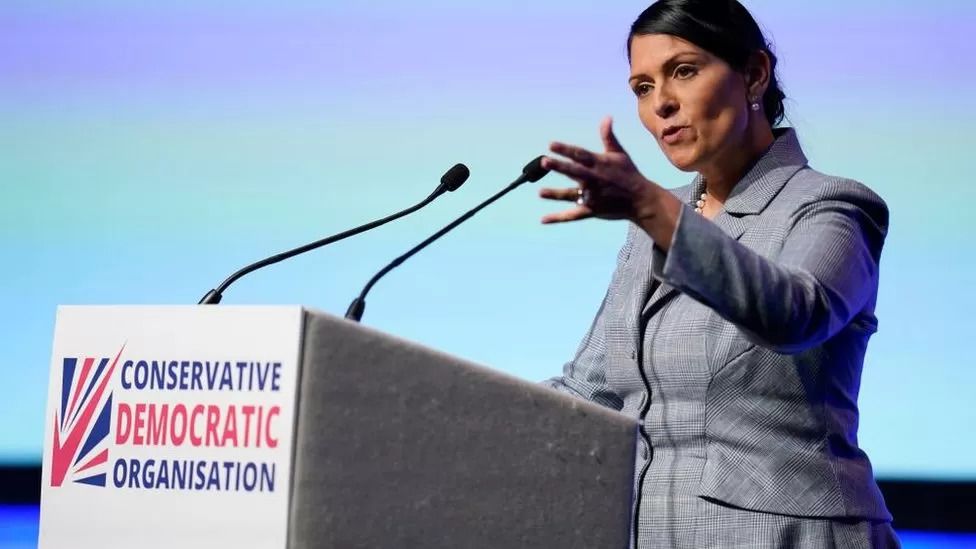
Vocal Tory right give Rishi Sunak a headache
"What is the point of all this?"
I am on the phone. The long-standing Conservative on the other end has an analysis that is unflinching.
"The party has wasted its period in power."
What I am hearing is a post-mortem, postponed.
We would have heard much more of it a week ago, immediately after the Tories' huge losses in the English local elections.
But the Coronation delayed the autopsy.
There is nothing delaying it now.
But much of the discussion privately within the Conservative Party, and in particular on its right wing, is much more than a reflection on a grim set of council results.
It is, instead, a much wider look back, and look forward.
Tory members
And along come two conferences doing exactly that, neither vastly helpful if you're sitting in Downing Street.
Firstly, the Conservative Democratic Organisation (CDO), which is all about party democracy, empowering the members.
The CDO, which was born out of the Boris Ballot - an unsuccessful campaign demanding Tory members get a vote on reinstating Mr Johnson after he resigned - met in Bournemouth over the weekend.
 Priti Patel was among the speakers at the Bournemouth conference
Priti Patel was among the speakers at the Bournemouth conference
The group insists they are more than a campaign to get Boris Johnson back as Conservative leader, but most at the conference would absolutely love that to happen.
And then there is the National Conservatism Conference (NatCon), an American import, with an emphasis on patriotism, Brexit and low taxes.
Post traumatic
This three-day gathering at Westminster, which got under way today, is expected to attract quite a few Tory MPs, who will listen to speeches from right wing commentators and Donald Trump-supporting US Senator JD Vance, among others.
NatCon has gathered once before in the UK, but it only involved a few dozen academics when it did.
This time it is attracting senior politicians - cabinet ministers Suella Braverman and Michael Gove and former cabinet minister Jacob Rees-Mogg, who was also at the CDO conference in Bournemouth.
If the chaos of last year, and the installation of Mr Sunak as prime minister led to something of a post-traumatic vow of silence within the Conservative Party, it seems safe to say that is over.
Privately, plenty are scathing about Mr Sunak.
Phrases that have made their way into my notebook in the last few days:
He is "a reverse firework."
He has a "quiescent defeatism."
These two conferences have generated excitement in some parts of the Tory Party. Asked why this was the case, my contact told me: "Rishi has a backhanded ability to enthuse people in the opposite direction."
Ouch.
But very few think it would be a good idea to try to remove him.
'Moved to the left'
Some of this is an expression of the frustrations of the failures of the right of the party: the spectacular implosion of Liz Truss's premiership yes, but what many see as a longer term failure throughout the Tory years in government.
"We accepted the Blair/Brown consensus. And then we gold-plated it," one said.
"Britain has moved to the left on our watch."
This is a reference - among other things - to the tax burden and the size of the state, two stones in the shoe of many on the right.
And some of it is an articulation of defeatism: "We are damned. We are condemned," in the judgement of one, when asked about the next general election.
This gets at an unspoken truth about both these conferences: they are about the future of the Conservative Party after the general election.
The ideas that might shape it, and yes, the people who might lead it.
'Principles of Conservatism'
Step forward Home Secretary, Suella Braverman, who gave a speech about immigration on Monday afternoon.
On Sunday night, Downing Street had signed off what she was going to say but some overnight "tinkering" from Mrs Braverman's team meant it was sent back to No 10 again on Monday morning.
The argument about immigration matters massively. We can expect lots of debate about it in the next 10 days or so.
But the home secretary's speech matters for what else she talked about: Her "overarching principles of Conservatism," as it was described to me.
The speech - which lasted around half an hour - was personal, touching on her family and her background.
Senior politicians only do this kind of thing when they have half an eye on the future.
In fact, scrub that. Both eyes on the future.
'Functional' government
No10 and the Conservative Party machine are attempting to put a brave face on all this, suggesting that a few hundred activists gathering in Bournemouth over the weekend is not worth attaching too much significance to.
And there are plenty of Conservatives - a quieter majority, I would say - who are relieved beyond words that the party, the government, is no longer a shambolic laughing stock in the eyes of many and is getting things done.
"It just feels great to be able to work away at things and achieve things, even little things," a minister confides.
"The system works, Downing Street works, things are functional. I know that doesn't sound like much but it is such an improvement."
Those around Rishi Sunak think his unflashy competence, as they see it, is exactly what people want after what went before.
But there are wider jitters in the party that competence won't be enough, and a glance too towards the political horizon and how that might look.










